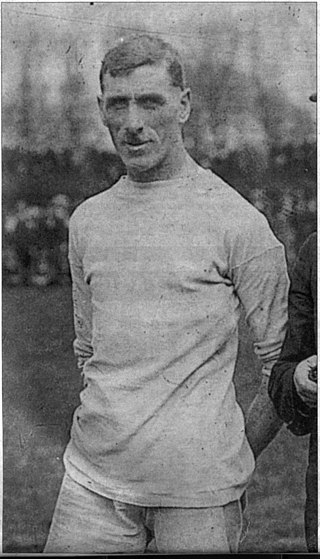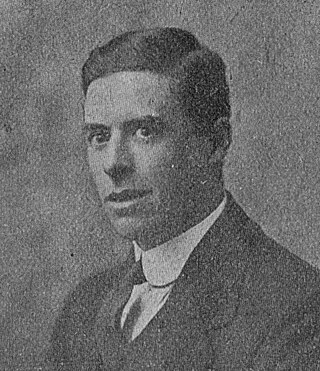
Manchester United Football Club, commonly referred to as Man United or simply United, is a professional football club based in Old Trafford, Greater Manchester, England. They compete in the Premier League, the top tier of English football. Nicknamed the Red Devils, they were founded as Newton Heath LYR Football Club in 1878, but changed their name to Manchester United in 1902. After a spell playing in Clayton, Manchester, the club moved to their current stadium, Old Trafford, in 1910.

William Henry Meredith was a Welsh professional footballer. He was considered one of the early superstars of football due to his performances, notably for Manchester City and Manchester United. He won each domestic trophy in the English football league and gained 48 caps for Wales, for whom he scored eleven goals and won two British Home Championship titles. His favoured position was outside right, and his key skills were dribbling, passing, crossing and shooting. A dedicated and extremely fit professional, his habit of chewing on a toothpick during games made him instantly recognisable.

John Henry Davies was a wealthy British brewery owner who in 1902 took over the football club Manchester United, which was then called Newton Heath. The club was struggling with a debt of £2,670 at the time.

Harry Stafford (1869–1940) was an English footballer who played a principal role in the formation of Manchester United Football Club. Born in Crewe, Cheshire, Stafford became a locomotive boilermaker employed by the London & North Western Railway (LNWR) at the expansive Crewe Works.
Manchester United Football Club was formed in 1878 as Newton Heath LYR Football Club by the Carriage and Wagon department of the Lancashire and Yorkshire Railway depot at Newton Heath. The team initially played games against other departments and rail companies at their home ground at North Road, but by 1888 the club had become a founding member of The Combination, a regional football league. However, following the league's dissolution before the end of its first season, Newton Heath joined the newly formed Football Alliance, which ran for three seasons before being merged with The Football League. This resulted in the club starting the 1892–93 season in the First Division, by which time it had become independent of the rail company, dropped the "LYR" from its name and moved to a new ground at Bank Street. After just two seasons, the club was relegated to the Second Division.

The Manchester derby refers to football matches between Manchester City and Manchester United, first contested in 1881. City play at the City of Manchester Stadium in Bradford, east Manchester, while United play at Old Trafford in the borough of Trafford, Greater Manchester; the two grounds are separated by approximately 4 miles (6.4 km). The teams have played 194 matches in all competitions; United winning 79, City 61 and the remaining 54 have been drawn. Amongst the most successful clubs in England, they have won a combined 104 honours: 68 for Manchester United and 36 for Manchester City. They are also the first two English clubs and first cross-city rivals to have won the treble; United's success came in 1999, while City's occurred 24 years later.

North Road was a football and cricket ground in Newton Heath, Manchester, England. It was the first home of Manchester United Football Club – then known as Newton Heath Lancashire & Yorkshire Railway Football Club – from its foundation in 1878 until 1893, when the club moved to a new ground at Bank Street, Clayton.

Bank Street, also known as Bank Lane, was a multi-purpose stadium in Clayton, Manchester, England. It was mostly used for football matches and was the second home ground of Manchester United Football Club, after North Road, which they left in 1893. The stadium had a capacity of around 50,000, but the club moved to Old Trafford in 1910 because club owner John Henry Davies believed he could not sufficiently expand the ground.

The 1909 FA Cup final was the final match of the 1908–09 FA Cup, the 38th season of England's premier club football cup competition. The match was played on 24 April 1909 at Crystal Palace, and was contested by Manchester United and Bristol City, both of the First Division. Manchester United won by a single goal, scored by Sandy Turnbull midway through the first half. This was the first of Manchester United's thirteen FA Cup titles to date.

John Powell was a Welsh association footballer who played as a full-back for Newton Heath in the late 1880s.
The 1885–86 season was Newton Heath LYR's third season of competitive football. The only competition that the club entered their first team in this season was the Manchester Cup, a competition in which they had reached the final at the first attempt the previous season. It was a case of "second time lucky" for the Heathens, as they went one better in the 1886 competition, beating Manchester 2–1 in the final to claim the first trophy in the club's history.
Joseph E. Davies was a Welsh footballer who played at half-back for Newton Heath and Wolverhampton Wanderers in the late 1880s and early 1890s. He also made seven appearances for the Welsh national team.
Louis Rocca was an English football administrator and scout who played a pivotal role in the development of Manchester United F.C. He had several roles within the club from the 1890s to the 1940s, most notably putting them in contact with Matt Busby in 1945; Busby would go on to manage the club for 25 years.
William Hood was an English footballer who usually played as an inside right, but was also often used as an outside forward or a wing half. Born in Ashton-under-Lyne, Lancashire, he played for Newton Heath, making his debut at left-half in a Football Alliance match at home to Lincoln City on 21 November 1891; Hood scored twice in a 10–1 win, the first time the club had scored 10 goals in a league match. Hood finished the season with five goals in 15 Alliance appearances as Newton Heath finished second behind Nottingham Forest and were subsequently elected to the Football League for the 1892–93 season.
John Owen Jones was a Welsh footballer who played as a forward for several clubs in Wales and England, including Bangor City, Crewe Alexandra and Newton Heath.

Walter Spratt was an English professional footballer who played as a full-back in the Football League for Manchester United and Brentford. Born in Birmingham, he began his career with Rotherham Town and made guest appearances for Clapton Orient during the First World War. After leaving Brentford in 1921, he played for Sittingbourne for a year, before ending his career with Elsecar Main.
The 1901–02 season was Newton Heath's 10th season in the Football League and their 8th in the Second Division. They finished 15th place in the league, avoiding relegation by only five points. In the FA Cup, the Heathens were knocked out by Lincoln City, losing 2–1 in the Intermediate Round.
This page chronicles the history of Manchester City in further detail from its early years in 1880 to 1928. See Manchester City F.C. for an overview of the football club.











